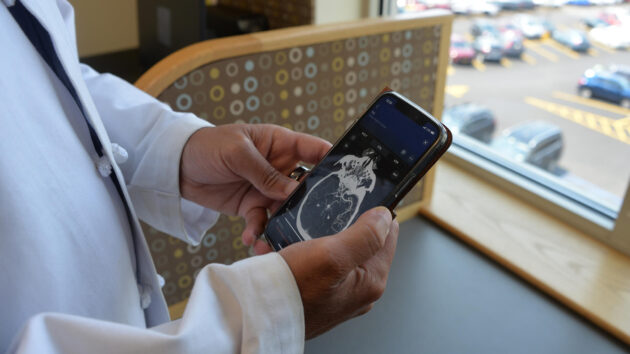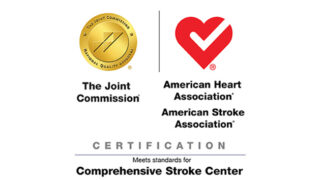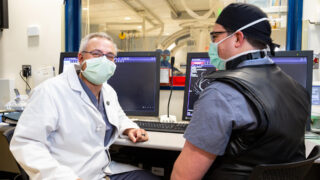Stroke
If you or someone you know is displaying symptoms of a stroke, call 911 immediately.
The severity of strokes can range from mild to life-threatening, but a stroke is always an emergency requiring rapid diagnosis and treatment. The Albany Med Health System offers the region's most advanced stroke care by connecting our hospitals to ensure that patients receive the most appropriate care in the right place. Our stroke team is ready 24/7 to provide patients with leading-edge treatments to improve their chances of a successful recovery.
Designated Comprehensive Stroke Center
Albany Medical Center has earned The Joint Commission’s Gold Seal of Approval and the American Stroke Association’s Heart-Check mark for Advanced Certification for Comprehensive Stroke Centers.
Albany Medical Center is a New York State-designated Comprehensive Stroke Center. We provide consultation and work closely with all hospitals in the Albany Med Health System, and throughout upstate New York, western Massachusetts and Vermont to facilitate rapid transfer of patients for treatment of stroke, especially for high level care.
Care Throughout the Capital Region
This page features stroke care at Albany Medical Center, a New York State-designated Comprehensive Stroke Center.
Learn more about stroke care at Columbia Memorial Health, Saratoga Hospital, and Glens Falls Hospital.
As an academic medical center, our patients have access to the latest treatments and devices.
Among the treatments we offer:
- IV and Intra-arterial rt-PA
- Mechanical Thrombectomy: Solitaire and Penumbra Clot retrieval devices
- Intracranial balloon angioplasty and stenting
- Endovascular coiling
- Aneurysm clipping
- Carotid stenting/carotid endarterectomy
- Viz.ai computer-aided triage system
Patients may show blockages or narrowing of carotid arteries, which are the arteries in the neck that supply blood to the brain. Carotid endarterectomies (CEA) and carotid artery stenting (CAS) are procedures that are performed to remove the blockages in the carotid arteries in order to reduce the risk of the first stroke or to prevent a recurrent stroke.
The following statistics show how frequently complications or death occur after these procedures at Albany Medical Center in a given quarter.
Definitions
Asymptomatic Disease: Patients show no signs or symptoms of stroke.
Symptomatic Disease: Patients have signs of recent acute stroke, Transient Ischemic Attack (TIA), or temporary/permanent loss of vision in one or both eyes.
Carotid Endarterectomy (CEA) Complication Rate - 1st Quarter, 2024
Asymptomatic Disease
30-Day Mortality Rate at Albany Medical Center: 0 percent
Post-Operative Stroke Rate at Albany Medical Center: 0 percent
TJC Standard: ≤ 3 percent
Symptomatic Disease
30-Day Mortality Rate at Albany Medical Center: 0 percent
Post-Operative Stroke Rate at Albany Medical Center: 0 percent
TJC Standard: ≤ 6 percent
Carotid Stent (CAS) Complication Rate
Asymptomatic Disease
30-Day Mortality Rate at Albany Medical Center: 0 percent
Post-Operative Stroke Rate at Albany Medical Center: 0 percent
TJC Standard: ≤ 3 percent
Symptomatic Disease
30-Day Mortality Rate at Albany Medical Center: 0 percent
Post-Operative Stroke Rate at Albany Medical Center: 0 percent
TJC Standard: ≤ 6 percent
For more information, please see the American Heart Association's Get with the Guidelines reporting tool. Once on the page, you can search via geographical location and disease specialty (i.e. stroke).
Artificial Intelligence Benefits Stroke Patients
The Albany Med Health System was the first in northeastern New York to apply the Viz.ai computer-aided triage system to help facilitate early access to the most advanced stroke care for patients at each of its four hospitals, including Albany Medical Center, Columbia Memorial Health, Glens Falls Hospital and Saratoga Hospital.
When a patient who is suspected of having a stroke arrives at the hospital, a CT angiogram is performed to assess blood flow to the brain. When the software detects a large vessel occlusion (LVO)—a type of stroke caused by blockage to one of the major arteries and having a greater risk of death or long-term disability—stroke specialists across the System are alerted immediately on their phones, allowing them to chat through the cloud-based platform in real time to plan for appropriate treatment or transfer of care to Albany Medical Center.
Neuro Intensive Care Unit at Albany Medical Center
Albany Medical Center houses a Neuro Intensive Care Unit, the only intensive care unit in the region specifically designed to serve patients with severe neurological conditions.




